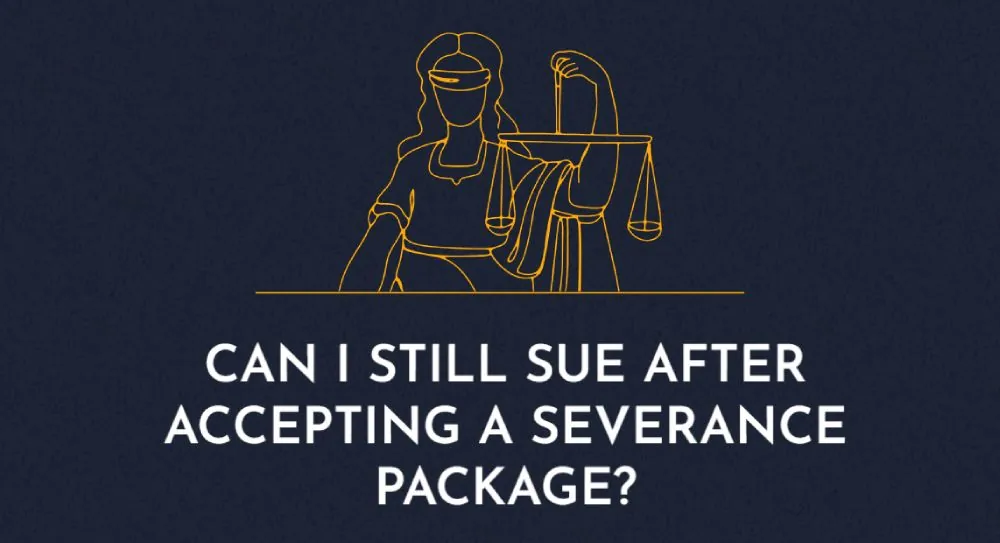
Many employees receive a severance package when they are terminated from their position. Severance packages can soften the blow of losing a job and provide much-needed financial support when transitioning into a new role.
You may be left wondering, Can I sue if I signed a severance agreement? This article may be helpful as we discuss the law surrounding severance packages and the subsequent right to sue your former employer.
But don’t rely on this article alone. It is best to consult an employment law attorney who can review the unique circumstances of your case and advise you on the best way to proceed.
At Brenton Legal, PA, we have experienced employment lawyers that can help you figure out if you have a valid legal claim against your former employer. Our team of attorneys has decades of experience and is available to help you understand your legal rights and responsibilities.
What is a Severance Package?
Can I still sue after accepting a severance package? Before delving into this question, we need to clarify what a severance package is. A severance package is a form of compensation that an employer pays an employee upon termination. Severance packages can include a wide range of benefits, including monetary compensation, extended healthcare coverage, and stock options in the company. A variety of factors may influence the terms of the severance agreement, including:
- The employee’s length of time with the company,
- The reason for the employee’s termination,
- The employee’s role at the company,
- The employee’s level within the company, and
- The company’s financial situation.
Whether you are entitled to a severance package depends on the type of employee that you are, the terms of your employment contract, your employer’s policies, and the relevant laws. If you are unsure if you are entitled to severance compensation, you should consult with an employment law attorney who can advise you on the issue.
If you’ve experienced workplace discrimination or harassment, your employer may offer severance. This severance pay is typically provided in exchange for a general release, which means you agree not to pursue legal claims against the company.
Take legal action if your employer fails to honor a severance agreement. File a lawsuit for breach of contract since severance agreements are legally binding. Consult an employment lawyer to assess your case and recover the promised severance pay.
If I Accept Severance, Can I Still Sue?
Yes, you can sue if the severance package did not include a release. However, if you signed a release, suing becomes more difficult. A release of claims clause prevents former employees from suing their employer for any employment-related issues that may have contributed to the termination. But not all severance agreements contain these clauses. In addition, even if the contract does contain a release of claims clause, it may be invalid.
Below, we will elaborate on the scenarios in which an employee can still sue their former employer after signing a severance agreement.
When There Was No Release of Claims Clause
As mentioned previously, a release of claims clause usually prevents employees from suing their former employers for employment-related claims. Generally, if a contract lacks any release of claims clause or a substantially similar provision, the employee is free to file a claim against their former employer. For instance, if an employee believes that they were wrongfully terminated, they may legally be able to sue for wrongful termination.
But you should know that including a release of claims clause is standard practice in severance agreement drafting, so it is unlikely that your severance agreement omitted such a clause.
When a Release of Claims Clause is Invalid
There are certain instances where release of claims clauses will be found to be unenforceable. Usually, these are situations where the employee can prove that their termination was illegal. Illegal terminations can be due to:
- Discrimination,
- Retaliation,
- Violations of public policy,
- Violations of employment contracts, or
- Whistleblowing.
These are just a few of the reasons that someone could have been illegally terminated. A seasoned employment attorney can evaluate whether you were illegally terminated and let you know if you have a cause of action against your former employer.
Negotiating Better Severance Agreements
If you have been terminated and offered a severance package, have an employment law attorney review the terms and conditions of the contract. An attorney can help protect your legal rights and interests and seek more favorable terms.
Consulting with an attorney before you sign a severance agreement is especially important if you believe that you were fired for illegal reasons (for example, if you were fired illegally due to discrimination based on your race, religion, gender, sexual orientation, or disability). In these instances, an employment law attorney can make sure that you do not sign away your legal rights to sue your employer for their illegal behavior.
Brenton Legal Is Here to Help You
At Brenton Legal, we know how difficult it can be to lose your job. The uncertainty, financial strain, and frustration can be overwhelming. However, we want you to know that we are here to help you get through this tough time. Our attorneys are passionate about employee rights, and we will always fight to get you the compensation that you deserve.
Because we know how financially strenuous these situations can be, we work on a contingent basis at Brenton Legal. This means that you don’t have to pay us until we win your case for you. We also offer free consultations to all our potential clients so that you can rest assured knowing that you picked the right lawyer.
There are important legal deadlines to meet in every employment law matter, so please don’t hesitate to contact us today. You can reach out to our office online or by phone.

